27 March
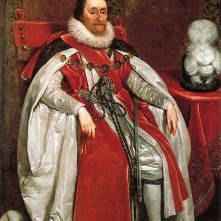
James I
1489 - The Treaty of Medina del Campo was signed between England and Spain. One part of it was the arrangement of the marriage between Arthur, Prince of Wales, and Catherine (or Catalina) of Aragon. It was signed by Spain on this day and ratified in 1490 by Henry VII.
1539 – Burial of George Talbot, 4th Earl of Shrewsbury, at St Peter's Church, Sheffield. He is known for his loyalty to the King during the Pilgrimage of Grace uprisings, which was seen as crucial to the failure of the rebellion. His offices under Henry VIII included Chamberlain of the Exchequer, Lieutenant of the Vanguard in the 1513 French campaign and Lieutenant-General in 1522 in the Scottish borders.
1555 – Burning of William Hunter, Protestant martyr. Nineteen year-old Hunter got into trouble when he was found reading the Bible in Brentwood Chapel. The plaque at the spot where he was burned reads:
"WILLIAM HUNTER. MARTYR. Committed to the Flames March 26th MDLV.
Christian Reader, learn from his example to value the privilege of an open Bible. And be careful to maintain it."
1563 – Death of Richard Pallady, member of Parliament and member of the household of Edward Seymour, Duke of Somerset and Lord Protector.
1599 – Robert Devereux, Earl of Essex, left London for Ireland as Lieutenant General.
1604 – Funeral of John Whitgift, Archbishop of Canterbury, at St Nicholas Chapel, Croydon Minster.
1620 – Death of Edward Lister, Physician-in-Ordinary to Elizabeth I and James I, in Aldermanbury in London. He was buried at St Mary's Church in Aldermanbury.
1625 – Death of James I at Theobalds, Hertfordshire. He was laid to rest in the Henry VII Chapel, Westminster Abbey on 5th May. John Donne gave the funeral sermon. James had been suffering with ill health for a few months, having kidney problems and attacks of arthritis and gout, followed by tertian ague and a stroke. It seems that he died during a severe attack of dysentery. He was succeeded by his son, Charles I.
28 March
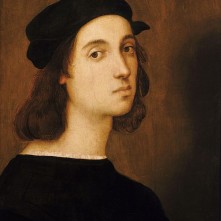
Thought to be a self-portrait of Raphael
1483 - One of the birthdates given for Raffaello Sanzio da Urbino, or Raphael as he is known, the Italian Renaissance artist and architect.
1489 – Death of Thomas Kemp (Kempe), Bishop of London and nephew of John Kemp, Archbishop of Canterbury, in Fulham. He was buried in the chantry chapel of St Paul's.
1552 – Death of John Skip, Bishop of Hereford, in London. Skip is known for being the chaplain and almoner of Queen Anne Boleyn, and preaching his controversial Passion Sunday sermon in April 1536. He survived the fall of Anne Boleyn and became Bishop of Hereford in 1539, when Edmund Bonner became Bishop of London. He was buried at St Mary Mounthaw, London.
1579 – Death of Sir Thomas Gargrave, administrator and Speaker of the House of Commons. He was elected as Speaker at Elizabeth I's first Parliament in 1559.
1591 – Birth of William Cecil, 2nd Earl of Salisbury and politician, son of Robert Cecil, 1st Earl of Salisbury, and grandson of William Cecil, 1st Baron Burghley.
29 March
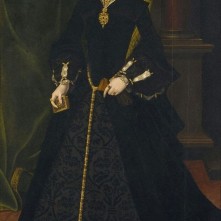
Mary Dudley
1551 – The marriage of Mary Dudley, eldest daughter of John Dudley, Duke of Northumberland, and Henry Sidney. Mary became a Gentlewoman of Elizabeth I's Privy Chamber in 1559, and is known for nursing the Queen through smallpox in 1562. Mary caught the disease and was badly disfigured as a result.
1555 - Former Dominican priest and Protestant martyr, John Laurence, was burned at the stake in Colchester.
1564 – Death of Sir Edmund Peckham, Privy Councillor in Mary I's reign, and High Treasurer of all the mints from 1544. He was buried at Denham Church in Buckinghamshire.
1591 – Burial of William Wager, playwright and Church of England clergyman, at the church where he was Rector, St Benet Gracechurch. His plays included “Enough is as Good as a Feast” and “The Longer thou Livest the More Fool thou art”, both polemical Protestant interludes.
1613 – Burial of Sir Thomas Bodley, scholar, diplomat, and founder of the Bodleian Library, Oxford. He was laid to rest in Merton College Chapel, Oxford.
1628 – Death of Tobie Matthew, Archbishop of York, at Cawood. He was buried in York Minster. Matthew had become Bishop of Durham in 1595, and then Archbishop of York in 1606.
30 March
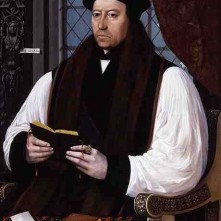
Thomas Cranmer
1533 - Thomas Cranmer, Archdeacon of Taunton, was consecrated as Archbishop of Canterbury in St Stephen’s College, Westminster Palace. See www.theanneboleynfiles.com/30-march-1533-thomas-cranmer-became-archbishop-of-canterbury/
1555 – Burning of Protestant martyr, Robert Ferrar, Bishop of St David's, at Carmarthen. He had already been deprived of his bishopric because he violated the vow of chastity by marrying and was condemned after refusing to agree to articles presented to him, articles which he saw as having been drawn up by man and not by God. He went to his death with courage.
1558 – Queen Mary I made her will, believing that she would soon give birth, and childbirth was a risky process. One of her desires expressed in the will was for her mother's remains to be moved from Peterborough to Westminster Abbey. This, of course, never happened. The will also made her unborn child her heir, with her husband, Philip of Spain, as regent. It was actually a false pregnancy, so Mary never went into labour.
1587 – Death of Sir Ralph Sadler, at the age of nearly eighty. Sadler was a diplomat and administrator who worked as Cromwell's Secretary before being noticed by Henry VIII. At his death, he was one of the richest men in England.
31 March
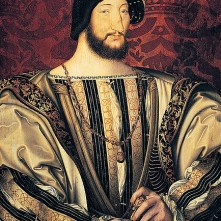
Francis I
1499 – Birth of Pope Pius IV, born Giovanni Angelo Medici, in Milan. He was Pope from 1559 to 1565.
1509 – The dying Henry VII made his last will and testament at Richmond Palace, three weeks before his death. It was based on an earlier draft, with some new provisions added, for example, the addition of Sir Richard Empson and Edmund Dudley to the list of executors.
1519 – Birth of Henry II of France, at Château de Saint-Germain-en-Laye, near Paris, Henry was the son of Francis I and Queen Claude, and he was King of France from 1547 to his death in 1559. His consort was Catherine de' Medici.
1532 - Princess Mary's confessor, Friar William Peto, preached a rather controversial sermon in the King's presence at Greenwich's Franciscan chapel. He compared Henry VIII to Ahab and drew comparisons between Anne Boleyn and Jezebel. See www.theanneboleynfiles.com/31st-march-1532-friar-petos-easter-sermon/.
1547 – Death of Francis I of France, at the Château de Rambouillet in the Île-de-France, and accession of Henry II on his 28th birthday.
1553 – Edward VI dissolved Parliament, after having opened it 1st March. It was his last Parliament.
1596 – Birth of René Descartes, French philosopher, mathematician, and writer, the “Father of Modern Philosophy”, at La Haye en Touraine in France. He is known for his dictum “I think, therefore I am”.
1631 – Death of John Donne, metaphysical poet, satirist, lawyer and clergyman. He was laid to rest in St Paul's Cathedral on 3rd April. Donne served as a member of Parliament, Royal Chaplain and Dean of St Paul's, but is best known for his poems, sonnets and epigrams, which included “For whom the bell tolls” and “The Flea”.
1 April
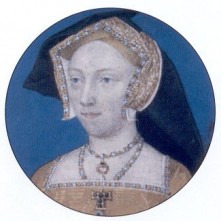
Jane Seymour
1536 - Eustace Chapuys, imperial ambassador, reported hearing that Henry VIII had sent Jane “a purse full of sovereigns” and that on receiving the purse, Jane had kissed the letter and begged the messenger to tell the King that she could not take the purse because “she was a gentlewoman of good and honorable parents, without reproach, and that she had no greater riches in the world than her honor, which she would not injure for a thousand deaths, and that if he wished to make her some present in money, she begged it might be when God enabled her to make some honorable match.”
1538 – Death of Sir Amyas (Amias) Paulet, soldier and landowner, at Hinton St George. In Henry VIII's reign, he served as a Sheriff, Justice of the Peace and steward of the Estates of the Bishop of Bath and Wells. Henry VII chose him to meet Catherine of Aragon as she travelled to London to marry his son, Arthur.
1570 – Death of William Alley, Bishop of Exeter. He was buried in Exeter Cathedral.
1571 – Death of Sir Thomas Cusack, Anglo-Irish judge, Master of the Rolls in Ireland, Keeper of the Great Seal, Chancellor of the Exchequer in Ireland, Lord Chancellor and Lord Justice. He was buried in Trevet, county Meath.
1572 – Death of John Cawood, Queen's Printer to Mary I, in London.
1577 – Death of Anthony Rush, Dean of Chichester. He was buried in St George's Chapel, Windsor.
1578 – Birth of William Harvey, English physician and the man who discovered the circulation of blood.
1578 – Death of Sir Arthur Champernowne, soldier, naval commander, member of Parliament and Vice-Admiral of the West. Edward VI knighted him for his service in France, and he was also involved in putting down the Prayer Book Rebellion.
1604 – Death of Thomas Churchyard, author and soldier, in Westminster, London. He was buried in St Margaret's Church, Westminster. Churchyard started writing in the reign of Edward VI and some of his poems were published in “Tottel's Miscellany”. His literary works include “The Firste Parte of Churchyardes Chippes”, “A Generall Rehearsall of Warres”, “Churchyardes Chance”, “Churchyardes Charitie” and “Churchyardes Charge”. Churchyard was also an active soldier, serving with the Duke of Somerset in Scotland and fighting as a mercenary for Protestants in Europe.
2 April
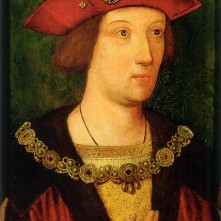
Arthur, Prince of Wales
1502 - Arthur, Prince of Wales, son and heir of King Henry VII and Elizabeth of York, died at Ludlow Castle in the Welsh Marches. He was just fifteen years old, and had only been married to the Spanish princess Catherine of Aragon for four and a half months. See www.theanneboleynfiles.com/2-april-1502-death-arthur-prince-wales-ludlow-castle/
1536 – Anne Boleyn’s almoner, John Skip, preached a rather controversial sermon in front of the King. Skip spoke on the Old Testament story of King Ahasuerus “who was moved by a wicked minister to destroy the Jews” but Queen Esther stepped in with different advice and saved the Jews. In Skip’s sermon, Henry VIII was Ahasuerus, Anne Boleyn was Queen Esther and Thomas Cromwell, who had just introduced the “Act of Suppression of the Lesser Monasteries” into Parliament, was Haman, the “wicked minister”. The sermon was an attack on what had been debated in Parliament and it was a statement on Anne’s stance and her beliefs. See www.theanneboleynfiles.com/2-april-1536-john-skips-passion-sunday-sermon/
1552 – The fourteen year-old Edward VI fell ill with measles and smallpox. Fortunately, he survived. His biographer, Chris Skidmore, believes that it was this bout of illness which suppressed the King’s immune system and which led to him dying of consumption (tuberculosis) on the 6th July 1553.
1559 – The Peace of Cateau-Cambrésis, ending the Italian Wars, was signed between Henry II of France and Elizabeth I of England.
1568 – Death of Sir Ambrose Cave, member of Parliament, Chancellor of the Duchy of Lancaster and Knight of the Hospital of St John of Jerusalem, at the Savoy. He was buried at Stanford after a funeral at the Savoy Chapel.
1571 – Death of Richard Onslow, lawyer, Solicitor-General and Speaker of the House of Commons. He caught a fever in Shrewsbury, while visiting his uncle there.

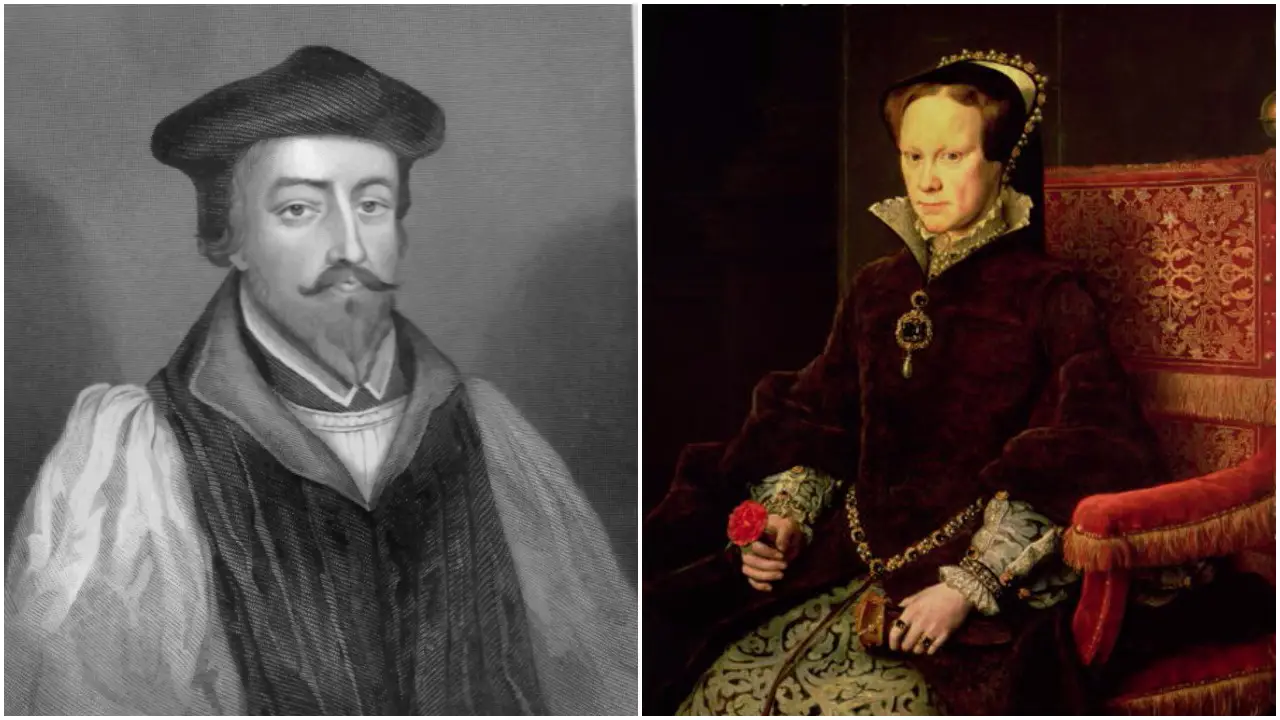
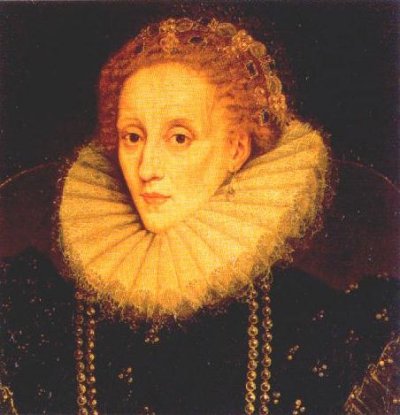
Leave a Reply